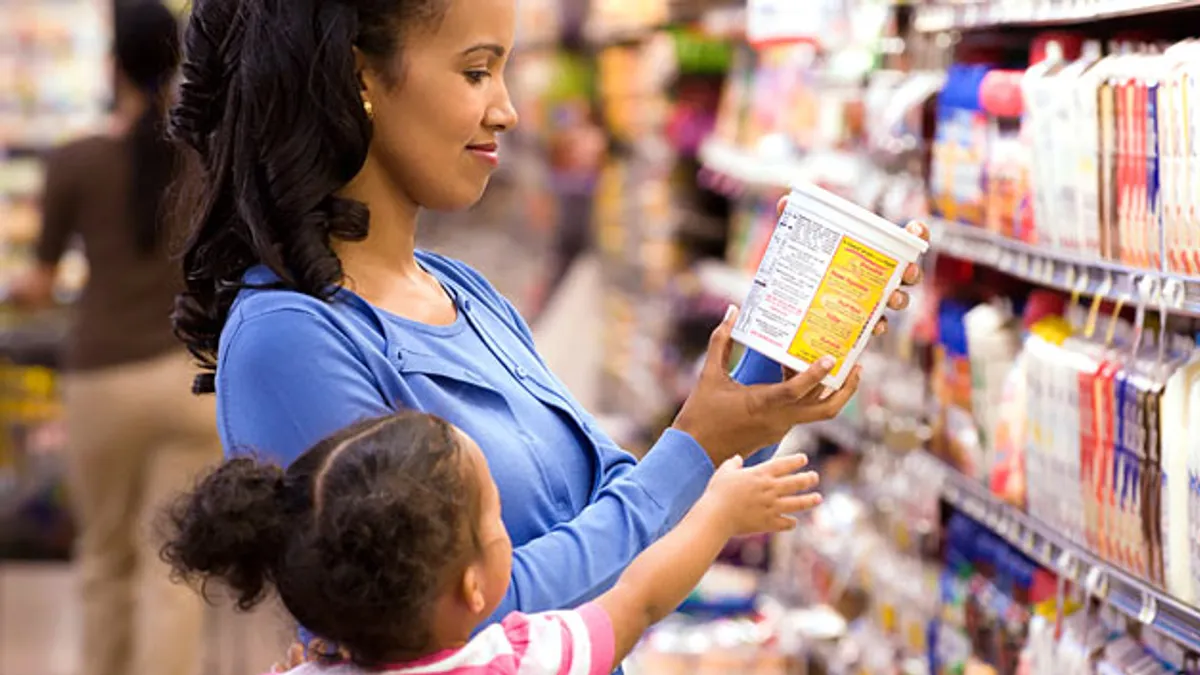Dive Brief:
- A report from The Hartman Group found that about 70% of consumers say they want retailers to be more transparent about their sustainability efforts. The results come from a survey of 1,500 people.
- Respondents also named Whole Foods, Walmart and Target among the most transparent companies when it comes to sustainability efforts.
- Increasing transparency, according to Hartman, allows companies to show the suppliers and processes behind the products they stock. At the shelf level, transparency increases a product's chances of being selected over an otherwise identical product, Hartman found.
Dive Insight:
“Sustainability” is a term that gets thrown around a lot in the supermarket industry, and many interpret it as referring exclusively to environmental measures like recycling, reducing emissions and using renewable materials.
As The Hartman Group notes, however, these days the term also touches on labor issues, animal welfare and other measures involved during product development. Sustainability, in essence, refers to anything that goes on behind the scenes. Shoppers want to know that companies are ethically sustainable as well as environmentally sustainable.
More than just a feel-good measure, increasing transparency around different aspects of sustainability can increase sales, according to The Hartman Group. Presented with two identical products, shoppers will typically go with the one that has a sustainable certification, or that somehow tells its backstory.
“Transparency is more than enabling a moral evaluation of trustworthiness for brands; it is a way for companies to reveal details about production and sourcing that enable consumers to find higher-quality distinctions otherwise concealed in conventionally marketed branded commodities,” Laurie Demeritt, CEO of The Hartman Group, said in a statement.
More and more brands are telling their stories on packaging as well as through digital channels. Ahold USA has clocked more than 15 million views of its “Fresh Stories” series, which profile suppliers in produce, seafood and various other categories. A profile of a salmon farming outlet in Maine has gotten more than 200,000 views on YouTube, according to the company.
Target, Whole Foods and Walmart have also made significant investments in transparency, as reflected by the Hartman Group's company rankings. In June, Target took steps to clean up its food labels and develop sustainable packaging, reporting a 139% increase in organic offerings and 162 new sustainable packaging designs. This week, Whole Foods named transparency as a top food trend for 2018, stating that "consumers want to know the real story behind their food, and how that item made its way from the source to the store." In September of 2018, all in-store Whole Foods items will have labels that will provide GMO transprency. Walmart recently partnered with IBM to launch two blockchain initiatives that tracked Chinese pork and Mexican mangoes through the food supply chain.
Beyond addressing social and environmental concerns, these measures put a human face to products that can oftentimes feel impersonal to consumers. However, retailers and suppliers need to be selective with their efforts here, or risk overwhelming consumers with information.
Also, as The Hartman Group notes, companies need to be aware that different consumers value different aspects of sustainability. Boomers, for instance, see sustainability as environmental measures while millennials see it as a matter of personal responsibility. These younger consumers, the firm notes, want to take action themselves by purchasing organic, fair trade and non-GMO products.









